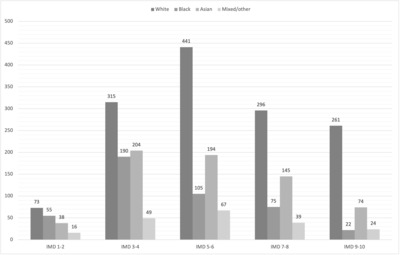Minopoli, M; Noël, L; Dagge, A; Blayney, G; Bhide, A; Thilaganathan, B
(2024)
Maternal ethnicity and socioeconomic deprivation: influence on adverse pregnancy outcomes.
Ultrasound Obstet Gynecol.
ISSN 1469-0705
https://doi.org/10.1002/uog.27625
SGUL Authors: Bhide, Amarnath Thilaganathan, Baskaran
|
PDF
Accepted Version
Available under License ["licenses_description_publisher" not defined]. Download (573kB) | Preview |
|
![[img]](https://openaccess.sgul.ac.uk/116310/6.hassmallThumbnailVersion/uog27625-sup-0001-figures1.png)
|
Image (PNG) (Figure S1)
Supplemental Material
Download (189kB) | Preview |
|
![[img]](https://openaccess.sgul.ac.uk/116310/11.hassmallThumbnailVersion/uog27625-sup-0002-figures2.png)
|
Image (PNG) (Figure S2)
Supplemental Material
Download (215kB) | Preview |
|
|
Microsoft Word (.docx) (Tables S1-S3)
Supplemental Material
Download (15kB) |
Abstract
OBJECTIVES: To evaluate the relative importance of ethnicity and socioeconomic deprivation in determining the likelihood and the percentage of composite adverse pregnancy outcomes (CAPO) and composite of severe adverse pregnancy outcomes (CAPO-S) METHODS: This is a single centre retrospective cohort study conducted in a tertiary maternity unit. Data regarding the ethnicity and socioeconomic deprivation were collected for 13,165 singleton pregnant women routinely screened in the first trimester for preeclampsia using the Fetal Medicine Foundation combined algorithm. RESULTS: The prevalence or risk of CAPO was 16.3% for White women, 29.3% for Black women and 29.3% for South Asian women. However, half of all CAPO cases (51.7%) occurred in White women. There is a strong interaction between ethnicity and socioeconomic deprivation (as measured with indices of multiple deprivation). Both influence the prevalence of CAPO and CAPO-S, with the contribution of ethnicity being strongest. CONCLUSIONS: Black and Asian ethnicity as well as socioeconomic deprivation influence the prevalence of placentally-mediated adverse pregnancy outcomes. Despite this, most adverse pregnancy outcomes occur in White women, who represent the majority of the population and are also affected by socioeconomic deprivation. For these reasons, inclusion of socioeconomic deprivation should be considered in early pregnancy risk assessment for placentally-mediated CAPO. This article is protected by copyright. All rights reserved.
| Item Type: | Article | ||||||
|---|---|---|---|---|---|---|---|
| Additional Information: | This article is protected by copyright. All rights reserved. | ||||||
| Keywords: | Ethnicity, composite adverse outcomes of pregnancy, indices of multiple deprivation, pre-eclampsia, preterm birth, small-for-gestational-age, socioeconomic deprivation, stillbirth, uteroplacental dysfunction, 1114 Paediatrics and Reproductive Medicine, Obstetrics & Reproductive Medicine | ||||||
| Journal or Publication Title: | Ultrasound Obstet Gynecol | ||||||
| ISSN: | 1469-0705 | ||||||
| Language: | eng | ||||||
| Dates: |
|
||||||
| Publisher License: | Publisher's own licence | ||||||
| PubMed ID: | 38419266 | ||||||
 |
Go to PubMed abstract | ||||||
| URI: | https://openaccess.sgul.ac.uk/id/eprint/116310 | ||||||
| Publisher's version: | https://doi.org/10.1002/uog.27625 |
Statistics
Actions (login required)
 |
Edit Item |



